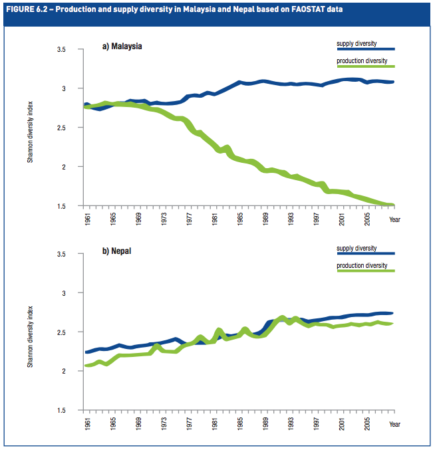
I really haven’t done sufficient justice to the new book from Bioversity, Mainstreaming Agrobiodiversity in Sustainable Food Systems: Scientific Foundations for an Agrobiodiversity Index, whose moving dedication I reproduce above. It’s a great review of the diverse reasons why agricultural diversity is important to us. But also of the complexities involved in translating diversity in farmers’ fields, let alone in genebanks, into development outcomes like better nutrition, as clearly shown by the diagram below.

The second reference I checked was no. 125. It’s not in Ethiopia but Finland. Life’s too short to read on.
A positive relationship was also found by Di Falco & Chavas (2009) in Ethiopia. There is likely a mix-up in the reference or the place.
If this is the first mistake you found after 65 pages of dense text, I think it must be excellent!
No: it was the first mistake after looking at two references. How do you know I read 65 pages? I only looked at the section `The roles of agricultural biodiversity in agroecological intensification’ knowing that almost anything about agroecology will be the reverse of excellent.
And the CGIAR, doing most of the work on agrobiodiversity, not least its conservation, is mentioned only once in the `65 pages of dense text’ (but several times in footnotes and references). This gives the people reading the document an entirely spurious view of just what is going on to help farmers and who is doing it.
I spent considerable effort introducing the concept of `agrobiodiversity’ to the Western World (the term probably originated in India) so I am a bit proprietorial about its use.
At least people are no longer citing Zhu et al. 2000.